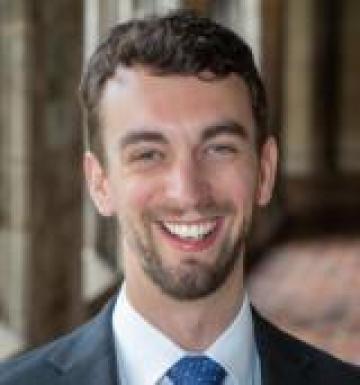Consumer Financial Management - Fellows
2025-26 Fellows

Matthew Jacob is studying the intergenerational effects of foreclosure on the economic trajectories of parents and children.

Justin Katz studies frictions in household debt repayment decisions to guide the design of government interventions in consumer credit markets, with a particular focus on the mortgage and housing sector.

Grace Ortuzar is examining policies designed to benefit low-income tenants and reduce homelessness.

Dominic Russel studies household borrowing behavior, lender incentives in consumer financial markets, and the impacts of credit on inequality.

Claire Shi is studying household debt, with a focus on repayment decisions, how parents shape the borrowing behaviors of their children, and lender contract design.
2024-25 Fellows

Justin Katz studies frictions in household debt repayment decisions to guide the design of government interventions in consumer credit markets, with a particular focus on the mortgage and housing sector.

Grace Ortuzar is examining policies designed to benefit low-income tenants and reduce homelessness.
2023-24 Fellows

Benedict Guttman-Kenney of the University of Chicago Booth School of Business is researching how technological innovation unraveled US credit card information sharing.

Jing Xian Ng is using lenders’ requirements that borrowers purchase private mortgage insurance to study the determinants of household consumption and saving behavior.

Charlie Rafkin of MIT is researching the effects and design of transfer programs for low-income households, with a particular focus on assistance for households facing eviction.
2022-23 Fellows

Menaka Hampole is working on three projects during her fellowship.
In one, she examines whether financial frictions impact human capital investments, using the staggered implementation of "no loan" financial aid policies intended to avoid student debt as a natural experiment to study the impact on choices of academic majors and occupations. She shows that these policies induced students to choose majors consistent with higher lifetime earnings, higher dispersion in earnings, and higher slope in earnings.
A project coauthored with Lucy Msall investigates how the sudden reduction in student loan burdens induced by the Student Loan Moratorium affected financial and labor market choices during the pandemic recession.
A third project, with additional collaborators, uses a natural experiment based on the staggered roll-out of the automated underwriting systems Desktop Underwriter and Loan Prospector by Fannie Mae and Freddie Mac to study whether increased technological sophistication improved credit access for low-income and minority borrowers.

Xian Ng is studying household savings and use of credit, behavioral frictions in household financial decision making, and the effect of financial product design on household behavior.
One of his projects during the fellowship, a collaboration with Benjamin Collier, Daniel Hartley, and Benjamin Keys, examines the effect of credit provision after a wealth shock due to natural disasters. It is finding that Small Business Administration loans cause lower delinquency rates, lower bankruptcy rates, and higher durable goods purchases after a natural disaster shock; the causal effect is identified using a debt-to-income ratio cutoff in loan eligibility. This result suggests that credit provision can be a low-cost way for policymakers to protect households from the worst financial outcomes after a negative shock.
Another project studies the use of mortgages as a saving commitment device. The project models sophisticated present-biased households who are unable to accumulate liquid savings. This generates an excess willingness-to-pay for lower recurring mortgage obligations to insure against income shocks. The project will estimate the excess willingness-to-pay from empirical data.